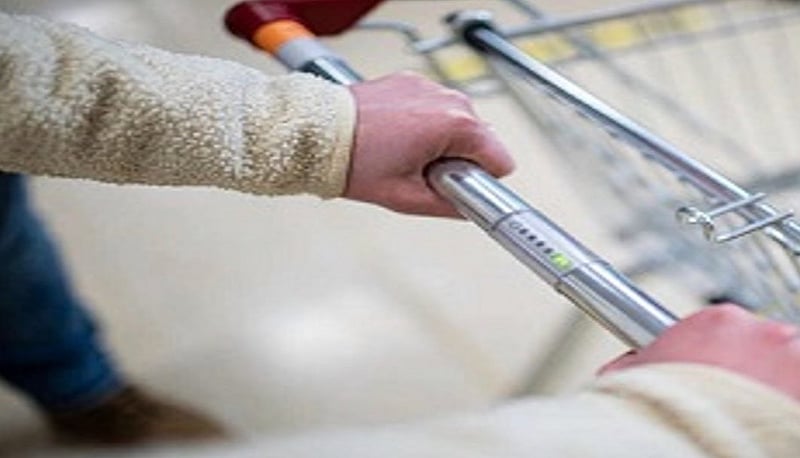Get Healthy!

- Alan Mozes
- Posted June 28, 2023
Someday, Your Shopping Cart Might Gauge Your Heart Health
Could a grocery cart save lives by preventing possible strokes? It just might.
The notion stems from a new British study in which grocery cart handles were embedded with electrocardiogram (EKG) sensors.
The goal: to screen shoppers for undiagnosed cases of atrial fibrillation (a-fib), the most common heart rhythm disorder.
"Atrial fibrillation is a leading cause of stroke,"explained Dr. Gregg Fonarow, director of the Ahmanson-UCLA Cardiomyopathy Center, co-director of the UCLA Preventative Cardiology Program, and co-chief of the UCLA division of cardiology, in Los Angeles.
"However, atrial fibrillation may be asymptomatic, and first diagnosed at the time of stroke,"Fonarow noted. "Some studies have suggested there may be as many as 750,000 to 1.5 million adults in the United States with atrial fibrillation that has not been diagnosed."
For its part, the study team -- led by Ian Jones, a professor at Liverpool John Moores University -- noted that more than 40 million men and women around the world are estimated to have a-fib, whether they know it or not.
For that reason, there's been a growing interest in finding ways to get more people screened as early as possible, Fonarow said, "as it may enable earlier diagnosis of atrial fibrillation and implementation of oral anticoagulation [anti-clotting therapy] to prevent strokes."
To that end, Jones and his colleagues conducted an experiment involving 10 grocery carts with handles that were outfitted with EKG sensors.
Over the course of two months, the screener carts were deployed in four different supermarkets in the Liverpool area, all of which included an in-house pharmacy.
Just over 2,100 shoppers participated in the trial. To do so, all were asked to grab hold of the specialized cart handlebar for a minimum of one minute.
When no heart rhythm issues were identified, the handlebar sensor illuminated green. In turn, all green-screened shoppers also underwent a manual pulse screening, to ensure that the handlebar sensor had accurately cleared them.
Whenever the handlebar did detect a heart rhythm issue, its sensor turned red. In that instance, an in-store pharmacist conducted both a manual pulse screening and a second sensor screening, though in the latter case the screening bar was not attached to a grocery cart. The EKG readings of all red-screened shoppers were then reviewed by a cardiologist.
Participants were then given one of three results: no a-fib detected; a-fib detected and confirmed (and cardiologist appointment made within two weeks); or an unclear reading, with an opportunity to repeat the process.
Ultimately, a total of 220 shoppers were flagged for possible a-fib, based on having either triggered a red light on the cart sensor and/or having an irregular pulse upon secondary examination.
Of these, 59 were determined to have a-fib. The average age of this pool of patients was 74 years, and about 4 in 10 were women. About one-third already knew they had a-fib, meaning that two-thirds were diagnosed for the first time.
Another 115 shoppers (of the 220) were cleared as not having a-fib, while the readings for 46 shoppers proved to be inconclusive.
As to the overall accuracy of the shopping cart screening method, the investigators determined that somewhere between one-quarter to one-half of all those shoppers who were diagnosed as having a-fib actually had the condition.
In other words, the method rendered an incorrect a-fib diagnosis in a high number of cases. At the same time, it was also determined that the shopping cart method missed about half of actual a-fib cases.
The findings were presented last week at a meeting of the European Society of Cardiology, in Edinburgh, Scotland. Such research is considered preliminary until published in a peer-reviewed journal.
Jones said in a news release that two-thirds of the shoppers randomly solicited for the experiment were happy to participate. That, he said, suggests the public is open to the approach, and that once accuracy tweaks are implemented more testing would be worthwhile.
Fonarow agreed.
"This new study demonstrates that screening for atrial fibrillation using a modified shopping cart may be feasible," Fonarow said. "But further studies are needed to evaluate this approach."
Another heart expert also expressed enthusiasm for the concept.
"I think grocery store shopping cart screening for [a-fib] sounds innovative and intriguing,"said Dr. James Sawalla Guseh, a cardiologist at Corrigan Minehan Heart Center and Massachusetts General Hospital.
"I think the study is indeed encouraging and merits replication in other environments,"Guseh added. "False positives would be my dominant concern. But I think the concept holds great promise, especially if complemented with patient education and medical follow-up. It is reminiscent of the successful community-based studies seen in American Black-owned barbershops."
More information
There's more on atrial fibrillation at the U.S. Centers for Disease Control and Prevention.
SOURCES: James Sawalla Guseh, MD, cardiologist, cardiovascular performance program, Corrigan Minehan Heart Center, division of cardiology, department of medicine, Massachusetts General Hospital, and instructor in medicine, Harvard Medical School; Gregg Fonarow, MD, director, Ahmanson-UCLA Cardiomyopathy Center, and co-director, UCLA Preventative Cardiology Program, and co-chief, UCLA division of cardiology, Los Angeles; European Society of Cardiology meeting, Edinburgh, Scotland, June 23 to 24, 2023





